60s Britain
What was it like to live in Britain in the sixties? Certainly many of the technological advances we enjoy today were unheard of then. There were no mobile phones or the Internet. There were limited opportunities for travel; for many, the most adventurous thing they could do was fly to Spain for their holidays.
The 60s was a time of great social change. How much was this change felt by ordinary people? To what extent was the 60s "old-fashioned" in terms of attitudes? Did people have less freedom and choice?
We asked people visiting the Swinging Sixties Exhibition touring Oxfordshire for their memories of the decade that gave us the Beatles and the Rolling Stones. We covered subjects as diverse as pop music and food shopping. At the end of the survey we asked the crucial question "Was life better in the Sixties or today?"
Music
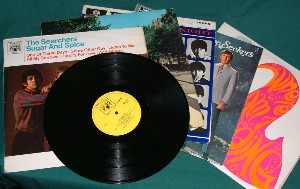
We asked...
What music did you listen to? Pop, jazz or classical?
Pop was the first choice of most people who were young in the 60s. Your favourites were:
- The Beatles
- Cliff Richard and the Shadows
- Gerry and the Pacemakers
- The Searchers
- The Rolling Stones
- Elvis Presley
- Herman's Hermits
Some people thought there was more of a generation gap than others. One guy told us that "Every record that came out was different from what my parents liked?", where as others said that their parents would listen to The Beatles or Cliff Richard. Some older stars were still popular, such as the Forces' Sweetheart, Vera Lynn.
Lets not forget Brett's in Broad Street, Oxford. Members could jump the queue, run up all those steps, start off in the fast room with the lights on, find a girl and off to the slow dance, quiet room. Wow! That was just the best!
Most of the guys like me who went to Brett's never got to the top of the stairs at Carfax Assembly Rooms without at least two or three girls asking if the could book a dance. I could never understand why the guys would nip out for a few drinks to get enough courage to ask a girl to dance. By which time they were too drunk to look half reasonable.
David - apprentice chippy at Kingerlee in Oxford in the 60s
i just loved the beatles! Ariana
More on 60s Music...
If you are looking for some inspiration read our main article about 60s Music.
Cinema
We asked "Did you go to the cinema in the 60s? If so, which films did you see? What did you think of them?"
The cinema was a little on the wane in the sixties. Television was very much making its presence felt and cinemas were starting to close. But the cinema was still a popular pastime with many who completed our survey.
How often did people go?
- "Once a week"
- "Twice a week"
- "Yes many times"
- "Sometimes"
- "Good value for money, especially Saturday morning flicks for only a tanner"
What did people watch?
These are some of your favourite movies from the sixties:
- James Bond ("Dr No", "Goldfinger", "From Russia with Love", "Thunderball")
- "Easy Rider"
- "The Sound of Music"
- "The Italian Job"
- Spaghetti Westerns ("The Good the Bad and the Ugly", "For a Few Dollars More", "A Fistful of Dollars"
- "Carry On" films
- "Did not like Elvis, but you had to go if you wanted to be sweet with a girl"

Eating out in the 60s
Eating out was less popular in the 60s than today. It was still an expensive luxury. For some, fish and chips on holiday was the nearest they came to a meal out. Restaurants though, were becoming more popular. Chinese and Indian cuisine was popular with the younger generation.
Some dining places mentioned in our survey were:
- Taj Mahal, Oxford
- Coffee bars
- Ley-on's, Soho, London
- Lyons Corner House
- Only on holiday, usually fish & chips and Devon Cream Tea once a year
- Pub food
- Woolworth's Café
An alternative to eating out was to ask friends around for dinner. This was popular from the fifties onwards and was cheaper than eating out.
Smoking
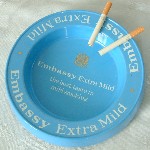
Smoking was still extremely popular in the sixties, nearly 70% of men and around 40% of women smoked. The most popular brand in the UK was "Embassy Filter".
In our survey most men smoked, but not all and less than half of the women. Woodbines were considered the cheapest cigarettes and Peter Stuyvesant was an up-market brand. Some men smoked pipes or cigars.
The risks of smoking were well known by the end of the sixties, but most people preferred not to think about them. The tobacco industry kept the habit alive by a campaign of confusing and contradictory information.
See also our article about smoking in the 70s and 60s cigarette culture.
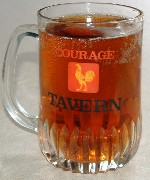
Drinking
We asked:
What was your favourite drink in the sixties?
These are some of the most popular:
Men's drinks:
- Watney's Red Barrel
- Double Diamond
- Light Ale
- Pale Ale
- Rum & Coke (the Beatles liked Rum & Blackcurrant)
- Barley Wine (if you lived in Oxford)
Women's drinks:
- Port & Lemon
- Gin & Orange
- Babycham
- Snowball
- Cherry Brandy
Wine did not have the following it has today. It was often considered expensive or requiring specialised knowledge to choose. Wines drunk by most were French or German. New World wine was almost unknown.
What were popular drinking places?
Pubs were favoured by most. Working Men's Clubs were mentioned, as were student or college bars. Some people preferred to invite friends around for a drink rather than go out to a pub. Generally I think that there was a lot less money to spend on alcohol than there is today.
Popular pubs in Oxford were The Elm Tree, Cowley Road, the Orange and Lemons in St Clements, the Rat's Hole in Cowley Road, the White Horse, Broad Street, the Crown, Cornmarket, and the Checkers in High Street; in London - the Well and Bucket, Bethnal Green and the Monatgue Arms South London; in Liverpool the Caridock in Bootle.
In Oxford the trendy pubs were the Eastgate, Whites was just about finished, and the Roebuck.
More on drinking in the 60s...
Have a look at our 60s and 70s beer guide.

Shopping for food
Supermarkets were fairly new in the 60s and many people still used local shops or corner shops for their main shopping. Some of these shops were prepared to deliver to the door, but increasingly people preferred the better value and choice offered by the supermarkets. In our survey it was split about 50:50 between supermarkets and local shops. Generally people in rural areas preferred local shops. However, one woman was prepared to walk three miles to the supermarket each week!
Some of today's familiar names were there in the sixties - Tesco and Sainsbury. Marks & Spencer also sold food in the sixties, though it was considered expensive by some. Some names from the past were MacFisheries and Fine Fare.
In the 60s, tea was still Britain's favourite, but coffee was gaining ground. See Coffee drinking in the 60s.
Consumer goods
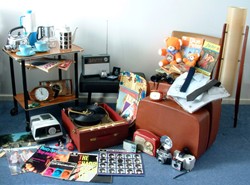
The sixties brought a revolution to the home in the form of a multitude of electric and electronic gadgets that made life easier and more enjoyable. The 60s was the decade in which television became almost universal. At the start of the sixties three quarters of the population had a TV, by the end it was nearer 100%.
In our survey, television and radio were the most popular gadgets that people owned, although TV was by no means universal.
These are some of the most popular gadgets
- TV
- Radio
- Record player
- Radiogram
- Reel to reel tape recorder
- Washing machine (twin tub)
Cameras were also popular. Large numbers of people still used a box camera or Kodak Brownie in the sixties. The other most popular camera was the Kodak Instamatic.
In the kitchen, most people had a washing machine, but it was more likely to be a twin tub than an automatic. Separate spin-dryers were also common. Electric irons were also owned by most people. Electrical gadgets were still considered luxuries by many and people had to save to buy things in the sixties rather than have them on credit.
"I married in 1964 and had two children by mid '67. We had little cash for luxuries so we used the launderette, listened to the radio and played records. We did have a small refrigerator passed on by others (Astral). In 1969 I bought a small fridge with a freezer above. I had a second-hand "Burco Boiler" for boiling nappies and whites. Otherwise it was the sink or bath! In 1969 we bought a Hoover washer with matching attachable spin dryer - second-hand."
60s Shopping - clothes
We asked "where did you shop for clothes in the sixties?"
Many people still made their own clothes in the sixties. One lady told us that she made her own dresses from bright, flowery material. Another said that "My mum made all my dresses or I got them from the tallyman who visited the village". Popular shops for ladies' clothes in the 60s were Marks & Spencer, C & A, the Co-op or Lewis's. More up-market were the London department stores.
For men it was the era of the made-to-measure suit. Most people in our survey went to Burton's or John Collier.
"Gear Box was amazing. I had a PVC flowered raincoat. The shop was run by Trina Sapcote who then went on to have another boutique next to the back of Rackhams. I can't remember the name of the first boutique to open which was in Waterloo St around 1965/6. I was given a stripped watch strap for being their first customer. I remember 2 gorgeous Mary Quant coats and dresses by Ossie Clark etc, etc. If only I had kept them!" Jacqueline L Miller

Cars and motoring
Minis were popular cars in the sixties. Some went for a two-tone colour combination with a black or red roof. One lady bought a grey Hillman and painted it with flowers in true hippie style.
"My first car on HP was a Vauxhall Cresta in two tone yellow. It had bench seats you could lay on. I rolled it when drunk, and my insurer went bust so I had to pay the loan off with no car."
Although in the sixties the British car industry was still strong, a few foreign cars were still finding their way to our shores. A couple of the more popular were the Renault Dauphine and the Fiat 500.
We asked about the new motorways
Some found them fantastic - "awe inspiring", "marvellous" and "excellent" were some of the comments. Others went out of their way not to use them: "Mother avoided them and used the Fosse Way - What's good enough for the Romans...".
Service stations were not well-liked. They were expensive for petrol and food and not considered pleasant. Only one lady told us that:
"I never used service stations until the late 60s and thought them fantastic compared to the lorry drivers' pull-ins we'd had to use for long runs previously. Somewhere to change baby in comfort and WCs that worked!"
Housing
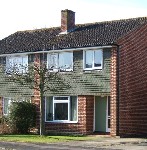
New house buyers in the sixties could expect to lay out their own gardens and in some cases build their own garages.
"First house on new housing estate in 1963 was a 3-bed semi in middle of Kent. Virgin garden. No garage - built own in 1964 - Marley pre-cast concrete. Needed 4 men to left the front brick faced piece."
"We moved into our house in the Whittlesey Fens in 1963. It cost my parents 2250, the mortgage was 18 per month. My mother still lives in it today and I love that house dearly. It always has a homely feel, safe. When we moved in it had no central heating so in the winter you went to bed with cardi's on. It was a new development of 20 houses and they bought it before it was even built." Ang
Read more on 60s houses.
The 60s - Issues of the day
The big issue of the sixties was Dr Beeching's savage pruning of under-used of branch lines. So far other issues and newsworthy items were:
- CND - "Ban the Bomb" Marches
- The Profumo Scandal
- The death President John F Kennedy
- The death of Sir Winston Churchill
- Harold Wilson's Labour Government
- Sinking of the Torrey Canyon disaster
- 1968 student uprising in Paris
- Racial unease
- Pollution
- Housing
- Princess Margaret's Wedding
- The Rhodesian Crisis
- Apartheid in South Africa
- Preparing for decimalisation
- The Common Market
- Biafra
- The Iron Curtain
- The Cuban Missile Crisis
- The Prince of Wales' Investiture
- 11+ and selective state education
- Rising interest rates
- The Sterling crisis and devaluation
- Winning the World Cup
- Manned space flight and landing on the moon
What was better in the 60s than today?
Many people mentioned a slower pace of life. There was less pressure to succeed and lower expectations. Although the sixties was, in many respects, a modern, forward looking decade, it was very different from today. I often wonder if every generation looks back on the previous one and sees a simpler, less complicated life.
Less traffic and quieter roads were also mentioned a lot. There were far fewer cars on the roads in the sixties. However, this did not stop some horrendous traffic jams in the holiday season. People were prepared to travel through the night to avoid traffic black spots on their way to the West Country and were often found sleeping in their cars in the early hours of the following morning. However, most of our respondents emphasised how quiet the roads were.
Respect was mentioned in most responses. There was greater trust and neighbourliness in the sixties. Families did more together and there was a greater sense of family values. Religion was also more important than today (although even in the fifties less than ten percent of people went to church regularly).
Freedom from crime, or perceived freedom from crime was mentioned by a number of people. In the sixties, in some areas, you could leave your house unlocked:
- "Children could play outside without too much worry"
- There was "freedom to walk around without fear"
- you "could trust people. Let children out to play without worrying"
Less crowded was frequently mentioned. There was more open space and green belt in the sixties than today. Many people missed open parks and common land. There is much greater pressure to build on land today than in the sixties.
Britain was cleaner in the sixties, there was less pollution and less noise.
When asked what was better today...
...there were four clear areas: better healthcare, more travel opportunities, technological advances and a freer, more equal society.
Although there were many medical advances in the sixties people today have access to much better healthcare, in spite of the NHS waiting lists. Many people felt that this was a significant improvement in their lives.
Travel opportunities and cheaper air travel in particular were mentioned by most of the responses. In the sixties, travel abroad was felt to be for the privileged classes only. Most people had to make do with a holiday in the UK.
Technology has improved considerably since the sixties. There were no mobile phones or internet access then. Although for many people most of the labour saving devices we use in the home today were available in the sixties, they were luxuries rather than everyday products. Automatic washing machines and dishwashers were for the few, rather than for the majority. Today most people can afford them.
Many of the social changes that began in the sixties were not carried out to their full course or universally accepted then. There is greater tolerance of different racial groups now than in the sixties and a greater recognition of women's rights.
The big question.....Overall, do you think life was better in the 60s than today?
This was a difficult question for most people to answer. For some the sixties was better, but only because they were younger. For others it was a case of "Yes and No". Technological change and greater social freedoms balanced the loss of community and a simpler life.
These are some of the answers:
- Yes, but only because I was younger
- Life was not so complicated in the sixties, but more physical as there were not so many household gadgets
- Safer, cleaner and children could be disciplined
- Less crowded
- Work culture different
- Difficult to equate
- Less material
- Better? Not sure!
- Possibly life was slower
- In a way, yes
- Prefer 2004 - travel - equality TV, information, computers
- Yes, but no responsibility then
"We need to re-evaluate post-war Britain. The 50s and 60s became more in touch with the spiritual and natural side of life. Life is far too commercial and 'consumer' now. The sixties were not so swinging just a reaction to the War and Victorian values."
"On the whole the sixties were happier times as it took so little to provide entertainment. Whereas today people have, so much and yet seem no happier and certainly don't seem to have the love of life we had. Maybe its because we'd won the War and were longing to see the benefits of peace and security. 1960 was only 5 years after all rationing ceased. "
"No the sixties were better. I think the teenagers of the sixties had the best of everything. War baby boomer's parents had nothing as children and wanted to shower their children with the best they could afford. The parents had broken the back of music resistance with Rock'n'Roll leaving the 60s wide open for a world change in music. And change it did, along came the pill, giving girls as much right to sex as boys, no more virgins to the altar! What more could you ask for, great music - free love and no really nasty diseases that could not be cured. These days it's not worrying about getting a girl pregnant - more are you going to die in ten years from aids? There is no contest - now can you turn me back to 16 please! "
Your comments
We welcome additional comments. If you feel you have something to add please complete the 60s Survey.

